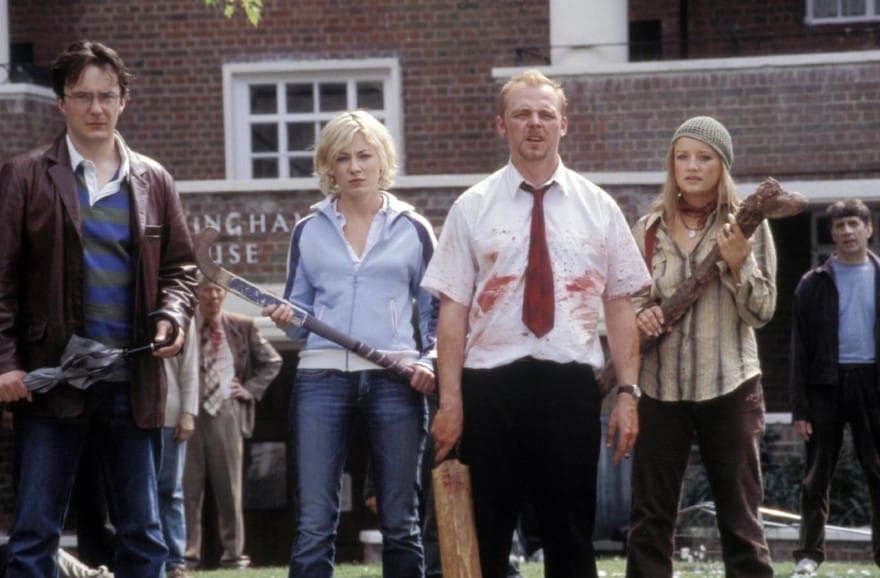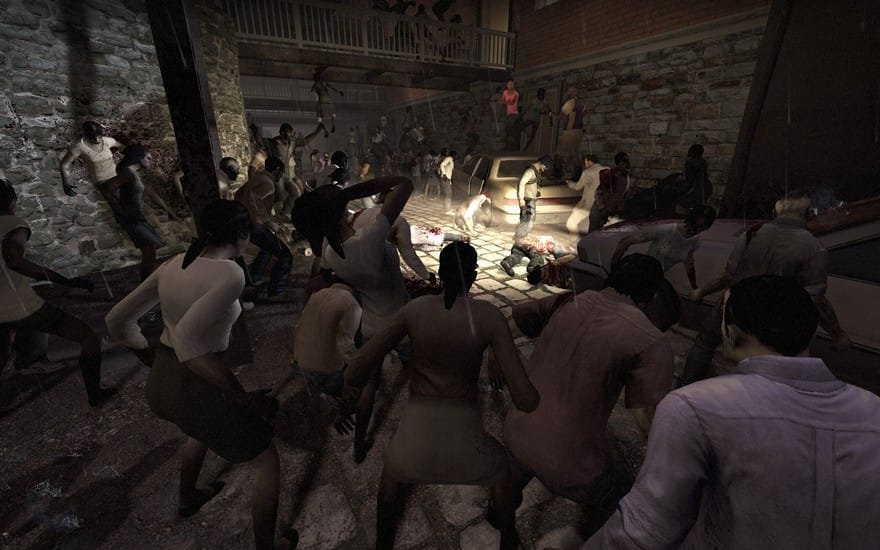The unified theory of all zombie fiction

Regardless of whatever else zombies have meant or stood for over their long popular run, at their core, they’re all the same. George A. Romero’s original shamblers in Night of the Living Dead might have been inspired by fear of Red Communism or of the inner city, and in Dawn of the Dead, the zombies’ postmortem attraction to the mall might have had something powerful to say about American consumerism. Military authoritarianism spawned Day of the Dead and 28 Weeks Later; we had wealth disparities in Land of the Dead, disease in 28 Days Later. There are morals and social commentary and even pop philosophy to be drawn from books and movie plots, but the ethical principle that lies at the heart of all of them is collectivism.
You can think of collectivism as opposed to the American national myth of rugged individualism, go-it-alone-ism, do-it-yourself-ism, “the notion that one person standing alone can fight the torrents.” Collectivism’s focus is the community as a whole and the cooperation that serves it, rather than the particular members. It’s the ground from which grow Marxism and communism and the democratic socialisms of Europe, but it’s also what underlies the early communitarian teachings of Jesus and the apostles, many monastic communities, and is a basic element of more traditional societies, where life revolves around family and community. The survival and well-being of the group is paramount, over and above the interests of its constituent parts.
Collectivism’s focus is the community as a whole and the cooperation that serves it
In zombie media, writers and directors draw clear, if unconscious, moral lines between individual- and community-oriented behavior. The character who hides a bite isn’t bravely holding out for a cure but endangering the group. The character who acts rashly or out of self-interest, like when David breaks the pub window in Shaun of the Dead, is fucking up, while the character who sacrifices himself, like Shaun going on his suicide run in the same, gets heroic music and teary close-ups.
Max Brooks’ original World War Z novel addressed the concept head-on. There is no protagonist, and the book is framed as a report for the UN’s Postwar Commission, which is itself a prediction about who has gained ground in the aftermath. In the first half of the novel, everyone from Israeli spies to American generals bemoan the world’s inability to join together and cooperate to stop the crisis. In the last half, the final solution comes from community-based living and primitive, cooperative squares of riflemen, plugging away one brain at a time; not individual heroes but almost anonymous members of a collective effort. The book also notes that, either post-bellum or during the war, the US established universal health care, the Israeli-Palestinian conflict ended, renewable energy was mastered, and the UN became the international military arbiter. Zombies, in short, provoking collectivism and creating a better post-world.

Take a more thorough example. Romero’s 1978 Dawn of the Dead has a group of survivors leaving their city in a helicopter and holing up in a mall. From the first, the film’s not quite on their side. All of them escape from public-serving jobs that are, importantly, still going on—Fran and Steven work for a TV station that’s broadcasting information about the outbreak 24/7 and Peter and Roger are national guardsmen assigned to cleanup duty. As they get into the helicopter, a group of cops, also taking off, asks if they’ve got cigarettes. The protagonists say no, and as the helicopter lifts off, they all light up. Awhile later, Peter says “We’re thieves and we’re bad guys. That’s exactly what we are.” Looking through a collectivist lens, not a great start.
They pass over a group of rural people who’ve teamed up with the Army to sweep the countryside and they make fun of the “rednecks.” But the movie then gives us a short, strange aside wherein we see that they’ve made a kind of community gathering of the plague there on the ground. And they’re doing just fine, drinking coffee and beer and plugging away, unlike our protagonists will make out at the mall.
Roger gets bit (and eventually dies) when they try to seal the mall’s doors, not just to keep out the undead, but, explicitly, also other people. The denouement of the movie comes with an attack by “motorcycle raiders,” but it’s not clear that they’re the bad guys. As they enter the mall, their leader calls out. “Alright guys, don’t be looking for yourselves—look for us.” They do just that, not looking to hurt any of the three remaining main characters they know to be in the mall. One of the three, Steven, fires at the raiders in a jealous fit—“It’s ours. We took it. It’s ours.”—and only then do the raiders attack them. Although the raiders have at this point put down a heroic number of the undead, they don’t actually kill any of the protagonists when they begin to fire back. Peter and Steven between them, though, murder a dozen of the bikers. Killing other people during a zombie outbreak must be the cardinal sin (“When the dead walk, señores, we must stop the killing or we lose the war,” says an old priest at the beginning of the movie), and Steven gets eaten shortly after for his troubles.
Killing other people during a zombie outbreak must be the cardinal sin
The collectivist stand-ins, the hillbillies and the bikers, seem to do just fine, but of the four public servants who abandon their posts to live out a consumerist fantasy, two end up dead-by-zombie, while the remaining pair fly off with “not much” fuel at the end of the film, one of them heavily pregnant. The message there might not be explicit, but it’s far from ambiguous.
Zombie videogames have made community just as central. In Left 4 Dead, players control one of four human survivors of a zombie plague who must make their way from one safe house to another across a series of campaigns. Cooperation is crucial—a survivor separated from the group by even a few meters is liable to be picked off by a special zombie’s long, sticky tongue, mounted by another, covered in putrid bile by a third, or overwhelmed by sheer numbers of the regular undead. A group cut down to three is hard pressed to make it through. Hoarding weapons or going Rambo are recipes for disaster, as is failing to constantly look out for your companions.
Other games, like State of Decay, emphasize what would be the real challenge of a zombie apocalypse: not so much gunning down an infinite tide of corpses but building something from the ruins. State of Decay focuses relentlessly on the maintenance of community. Instead of setting the player character’s individual struggle at the fore, the game puts you in charge of an entire group of survivors, managing their food and medicine and mood, highlighting the individual sacrifices that must be made for the good of the common community. Everybody gets a little less run-and-gun and everybody gets to live a little longer.

Just as much as movies and books, though, directors and designers authored those experiences, and there’s an argument to be made that if players had more agency—total free rein—that things might go another way. That survival might be less collective. But zombies always illustrate the brutal awfulness of going it alone, and DayZ is the game that hammers the point home.
Initially a mod for the military simulation Arma 2, DayZ puts you down unarmed in the fictional Soviet republic of Chernarus, modeled on and as large as a 225km2 patch of the Czech Republic. Arma 2 strives for realism, and, accordingly, DayZ players must feed and clothe themselves as they navigate towns and countryside peppered with other players and the undead. Survival is precarious—supplies are short on the ground, and any foray into once-populated areas, whether for cans of sardines, a drink of clean water, or saline for a transfusion, carries the risk of exposure.
Death means restarting from scratch, the loss of what could be hours or days of work, and it’s never more than a few missed mealtime, a cold overnight, or a zombie swipe away. Individual survival is possible, but long-term living and eudaimonia are group enterprises. Cabals of players can watch out for each other as they eat, drink, and sleep, and they can fan out, scavenge, and pool their resources from Chernarus’ ruined cities in a way that solitary operators cannot. Tight collectives are also the best way to survive the lone-gunman prepper stand-ins that are a far more dangerous threat than zombies in DayZ.
Death means restarting from scratch, the loss of what could be hours or days of work
Zombies, like plagues and nuclear holocausts, flare up most in times when we feel real destruction looming over us, whether it’s the Cold War he Gas Crisis of the 1970s, or right now, as climate change is posing an ever-more-obvious threat to the way we live. But zombies aren’t just a bellwether of how endangered we feel; they may well be an indication of how we might save ourselves. Their enduring popularity implies some shared unconscious agreement with their collectivist premise, and it may be that if we’re on board with the idea that the only way to rebuild the world is to sacrifice some of our individualism on the altar of survival, then it might also be the way to head off the apocalypse before it happens. The notion of sacrifice for the Greater Good is tinged by fears of radicalism and Red Communism in the United States and comes with whiffs of ration lines and grey, drab living. But what games like DayZ don’t just show but prove is that the end result of such self-denial is just the opposite—not only living through the apocalypse but having more fun doing it.



